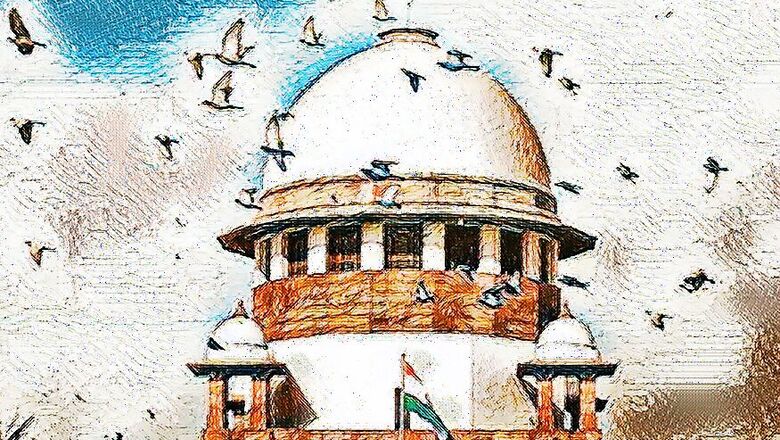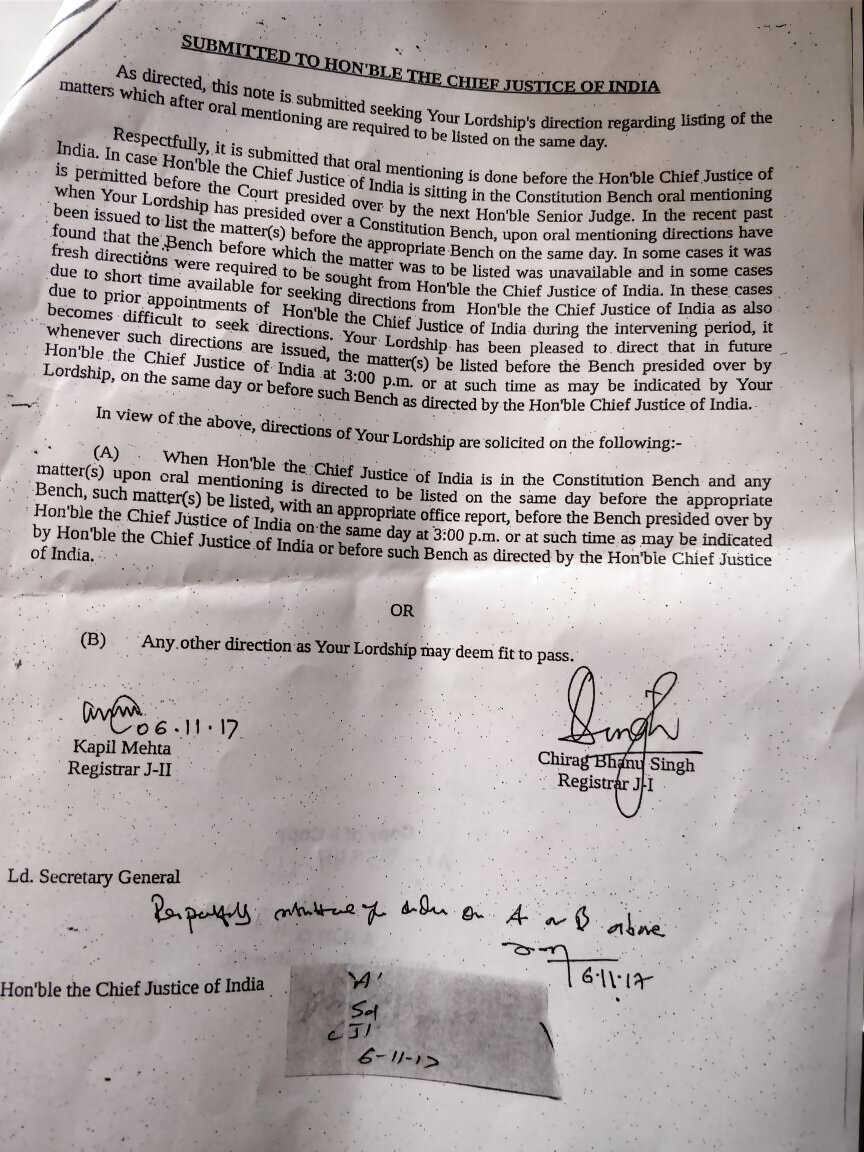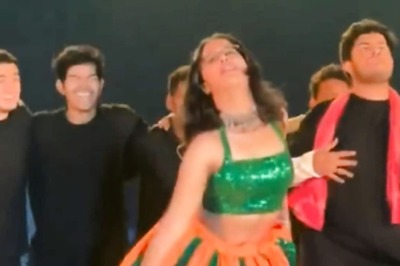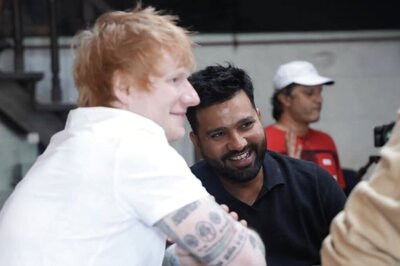
views
New Delhi: The last 48 hours in the Supreme Court of India have witnessed exceptional events.
On Wednesday, a three-judge bench headed by Chief Justice of India Dipak Misra recalled the orders passed by another bench of the apex court in two cases.
Both the cases pertained to issues of considerable significance. The first one related to the protracted stand-off between the central government and judiciary over finalising the new norms for appointment of judges in the Supreme Court and high courts. The second one was a matter related to exploring the possibility of an alternate forum to decide criminal appeals without delays.
While the other bench comprising Justices Adarsh K Goel and Uday U Lalit sought assistance of the Attorney General, the CJI-led bench wrapped up the cases without requiring to hear the AG on the first day, in a hearing spanning less than 30 minutes.
Questions arose what exigency required the bench headed by the CJI, who is also the master of the roster and is in-charge of allocating cases to different courts, to transfer these two cases to itself and then close the proceedings?
Did it not undermine the wisdom of the other bench, which wanted to go into the cases in details and had even requested the AG to assist? Was it not an instance of an "intra-court" appeal in the Supreme Court, which neither the Constitution nor does the Court rules acknowledge?
Then came Thursday.
Senior advocate Dushyant Dave approached Court number 2, headed by Justice J Chelameswar, for an urgent listing of a PIL. He claimed that the top court must step in because the credibility of judiciary and the judges were at stake in view of certain bribery allegations and hence, the truth has to be unravelled.
But this request was not much different from the one on Wednesday, when he had shown up before Justice Chelameswar.
A day ago, Dave along with advocate Prashant Bhushan, had mentioned a similar PIL, arising out of the same criminal case and with identical prayers. Justice Chelameswar, who had to hear cases meant for urgent listing because the CJI was heading a Constitution Bench matter, posted the other case on Friday.
However, on Thursday, Justice Chelameswar agreed to take up the second similar matter on an urgent basis at 12.45 pm. The direction was to place the case before a bench headed by him.
This was apparently a departure from the usual practice in the Supreme Court, where even the urgent matters are directed to be placed before an "appropriate" bench, which is decided by the CJI.
But Justice Chelameswar manifestly decided not to wait for the CJI to take a call on the administrative side as to which bench should hear the case.
Meanwhile, 45 minutes before the scheduled hearing of this case in Court number 2, the Constitution Bench led by the CJI got up abruptly in Court number 1 and said it will resume proceedings at 2 pm.
At 12.45 pm, Dave stood before the bench of Justices Chelameswar and SA Nazeer. He demanded an independent probe by a special investigation team under the supervision of a former CJI in the wake of the allegations that the rot of corruption behind granting approvals to medical colleges could run to the top judiciary. Dave pointed out that a former Odisha High Court judge was arrested in this case and the FIR indicated others could also be involved.
Justice Chelameswar found substance in Dave's arguments and agreed to examine the case "in the interest of the institution and the whole nation".
Not just the bench directed the CBI to produce all materials on investigation in this case before the apex court for a safe custody which essentially meant a stay of trial proceedings, but also referred the matter to a Constitution Bench.
Seconds before Justice Chelameswar was to dictate the order, the bench received a draft order issued "purportedly by the CJI”. This order, according to the sources, talked about listing of the similar PIL before another court on Friday.

Unfazed, Justice Chelameswar passed the order and said that the CJI's order on administrative side about listing of the case shall be placed along with the order being passed by him.
On his part, Dave further said that the order has to record that the CJI should not deal with this case either on the judicial side or on the administrative side because most of the cases of granting recognition to medical colleges were heard by the bench led by the CJI.
Justice Chelameswar cited Article 145(3) to state that a matter could be placed directly before a Constitution Bench and that he did not think there was a necessity to pass such an order.
In its order, the bench further said that the case shall be heard by five senior-most judges in the Supreme Court.
This direction is also questionable since who shall comprise a Constitution Bench is usually decided by the CJI, after the matter is placed before him. The possibility of an opinion by the CJI seems to be dispensed with, in the order dictated by Justice Chelameswar.
When the CJI refers an issue to a larger bench, even then the order mentions that the matter be placed before the CJI for constitution of an appropriate bench, but this practice was done away with perhaps because Dave's petition had said the CJI should be kept away from this case both on judicial and administrative side.
In case of exclusion of the CJI, the Constitution Bench is located to be headed by Justice Chelameswar again being the second senior-most judge.
While this case has to now come up on November 13, the other PIL will be heard by a different bench on Friday.
Cases getting withdrawn from some other court or an apparent negation of the authority of a CJI have been unprecedented developments at the highest court of the land whose credibility must remain unimpeached for keeping up the faith of the people.
The opaqueness of the system also generates several questions about procedures and practice being followed in distribution of important cases equitably between all the benches of the Supreme Court where the CJI is "the first among equals" only in terms of his administrative authority.
The extraordinary events in the last 48 hours demand concerted efforts by the fellow judges and senior lawyers to play the role of conscience-keepers and make sure the glory of the institution remains intact. They must rise to the occasion being the equal stakeholders in the institution. Their silence and abstinence at such a time of crisis may in fact prove too costly.
















Comments
0 comment